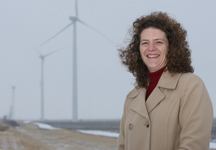Scientist: Midwesterners open to wind farms, especially in rural areas
March 27, 2013
 |
|
Linda
Prokopy's research sheds light on why some communities in Indiana are welcoming
of wind turbines while others have rejected them. (Purdue Agricultural Communication
photo/Tom Campbell)
|
WEST LAFAYETTE, Ind. - Indiana residents are overwhelmingly receptive to wind farms in their communities, even in areas that have rejected turbine development, according to Purdue University studies.
Linda Prokopy, an associate professor of natural resources planning, said much of the research on attitudes toward wind energy and wind farms has focused on coastal states and the reasons people don't want turbines in their communities. She and Kate Mulvaney, a former graduate student, wanted to know how people in the Midwest feel about having wind farms in their communities and the factors that led some places to embrace or reject them.
Prokopy and Mulvaney published two studies on their results in the journals Energy Policy and Environmental Management. One focused on Benton County, Indiana, which has embraced wind farms. The other study compared Benton County with two other Indiana counties - Boone County, which rejected wind farm development, and Tippecanoe County, which at the time was still considering wind farms. The researchers conducted surveys and interviews and studied local newspaper articles on wind energy.
"We found that there is not a lot of opposition from the people in the Midwest," Prokopy said. "And there are not a lot of perceived negative impacts from people who have or live near wind turbines."
In each county, more than 80 percent of survey respondents said they either supported wind farms in their counties or supported them with reservations. That was the case even in areas where local governments were against wind farm development or newspaper articles trended toward more negative aspects of the farms.
"We would have expected differences in support based on the media coverage, but what we found was support across the board," Prokopy said.
Mulvaney said Benton County, which has more than 500 turbines and hundreds more approved, welcomed wind farms for a variety of reasons, including local government support and options for diversifying development within the agricultural-based economy.
"In Benton County, agricultural land is the basis of the economy," Mulvaney said. "Using the land to produce wind is the same or similar to using the land to produce a crop in many people's minds."
The Purdue Extension agent in that county was instrumental in helping to draft ordinances that benefited the communities in which turbines would be located and providing residents with information about wind farm impacts.
"He was definitely seen as a trusted source," Prokopy said.
Despite support from residents, Boone County turned down wind farm development. Prokopy said the biggest factors in that decision were a well-organized opposition and a lack of governmental support.
"The opposition appeared to come from people who worked in Indianapolis but lived in rural parts of the county. They wanted to preserve their landscape," Prokopy said. "They were in the minority, but they were very vocal and, thus, influential in terms of local government."
In Tippecanoe County, Prokopy and Mulvaney said the government was supportive, but there was also a strong vocal minority.
"The opposition in Tippecanoe County was focused on setbacks, noise regulations and other rules," Prokopy said. "It was focused on making sure people were protected."
Prokopy said the data suggest the Midwest could be more receptive to wind farm technology, especially in more rural areas that lack other development.
"It certainly shows that many of the concerns that have kept wind farms from developing on the coasts aren't issues here in the Midwest," Prokopy said.
The Purdue College of Agriculture funded the studies.
Writer: Brian Wallheimer, 765-496-2050, bwallhei@purdue.edu
Sources: Linda Prokopy, 765-496-2221, lprokopy@purdue.edu
Kate Mulvaney, 401-486-1135, kmulvane@purdue.edu
ABSTRACT
A Tale of Three Counties: Understanding Wind Development in the Rural Midwestern United States
Kate K. Mulvaney, Patrick Woodson, Linda Stalker Prokopy
Ag Communications: (765) 494-2722;
Keith Robinson, robins89@purdue.edu
Agriculture News Page

